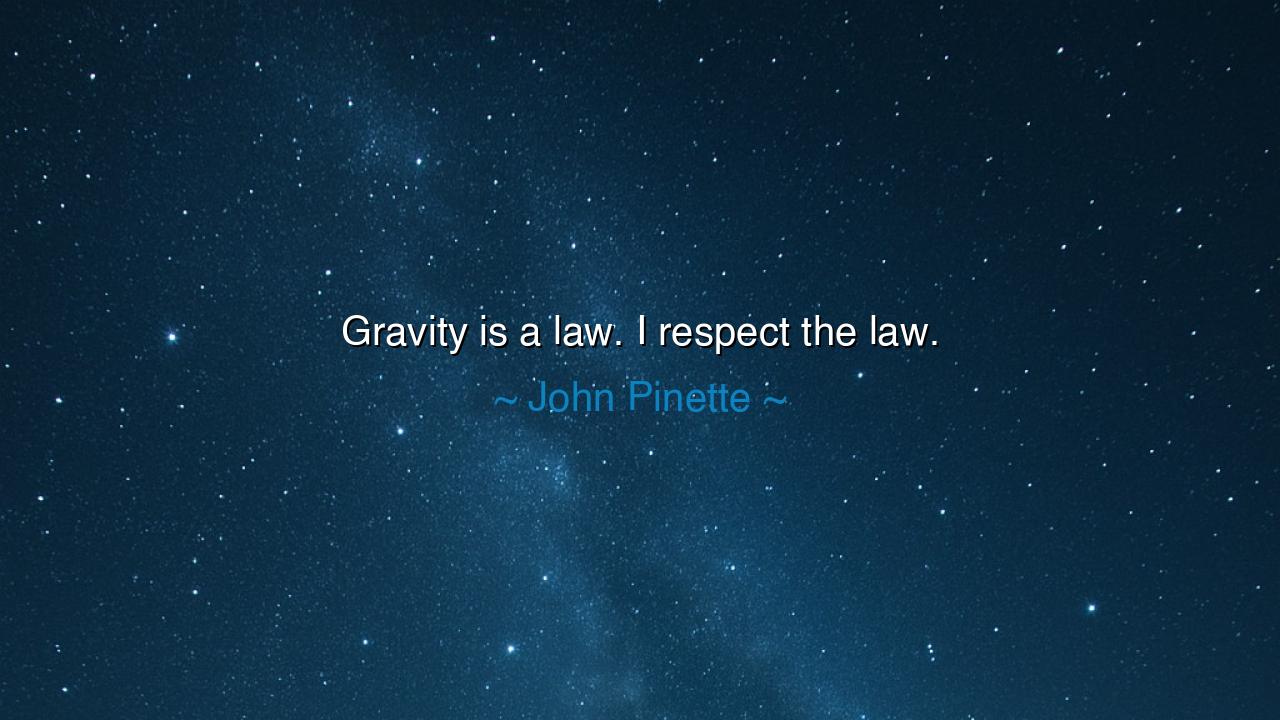
Gravity is a law. I respect the law.






In the vast and intricate dance of the cosmos, few forces are as constant and as unyielding as the laws that govern our existence. John Pinette's simple yet profound words, "Gravity is a law. I respect the law," speak to a deep understanding of the fundamental order that binds the universe together. These words are not merely a nod to the physical law of gravity, but also a reflection on the larger principle that governs all aspects of life—the law of nature, the immutable force that dictates not only the motions of the stars but also the behaviors of those who walk the earth.
In the ancient world, the understanding of natural laws was of paramount importance. The Greeks, particularly Aristotle, sought to understand the principles that governed both the physical and ethical world. Aristotle believed that the natural laws of the universe were woven into the very fabric of existence, and it was the human duty to observe, respect, and understand these laws. Much like Pinette’s simple respect for gravity, the ancients understood that to live in harmony with the universe, one must first recognize and align oneself with these fundamental principles—whether they be laws of the body, of the soul, or of nature itself.
Gravity, as Pinette humorously and humbly points out, is an undeniable force that we cannot escape. It shapes the very world we live in, keeping us grounded and tethered to the earth. But it is not only gravity that governs our existence. The natural world is filled with such laws—laws that we may not always understand fully, but must respect if we are to live in harmony with the forces around us. Newton, in his work on the laws of motion, introduced us to the understanding that the universe is not chaotic but is governed by order and balance. Just as gravity is a law that no man can defy, so too are the laws of nature that shape our actions and define the rhythms of life.
Consider the story of Galileo Galilei, whose life was dedicated to uncovering the laws that govern the heavens. Galileo, in his pioneering experiments, discovered that the planets move according to mathematical laws that were universal and unchanging. His findings, though controversial in his time, were a testament to the idea that the universe follows order and that we must learn to respect these natural laws. Galileo’s respect for the natural world, and his willingness to seek the truth, aligns with Pinette's humble recognition of gravity as a law—a reminder that all the forces of nature, from the simplest to the most complex, are worthy of our reverence and understanding.
But the lesson Pinette imparts through his simple acknowledgment of gravity is not merely about respect for the physical world—it is also about recognizing the deeper laws that govern the moral and ethical realm. The ancients believed that living in accordance with the laws of nature was not just a matter of observing the physical world, but of understanding one’s role in the great cosmic order. Confucius, for example, taught that society must live according to certain ethical laws that foster harmony and balance. These laws, though intangible, are just as real and as powerful as the physical laws we observe in nature. Just as we cannot escape gravity, we cannot escape the moral laws that shape the human condition.
In our own lives, we are often confronted with choices that challenge our respect for these natural and moral laws. Just as gravity will inevitably pull us back to earth, so too will our actions bring consequences based on the laws of cause and effect. If we live in defiance of the laws of nature, or the moral laws that govern human relations, we are likely to experience disorder and pain. But if we respect these laws, as Pinette suggests, we open ourselves to a life of balance, peace, and harmony.
The lesson to be learned is simple, yet profound: respect for the laws of the universe, whether physical or moral, is the key to living in harmony with the world around us. Like Newton, Galileo, and the ancient philosophers, we must seek to understand the forces that shape our lives, and to align ourselves with them. Whether in our personal lives, our communities, or in the vast universe itself, our actions must be in accordance with the laws that govern existence. In respecting these laws, we honor the order of the universe and ensure that we, too, move in balance with the forces that shape our world.






AAdministratorAdministrator
Welcome, honored guests. Please leave a comment, we will respond soon